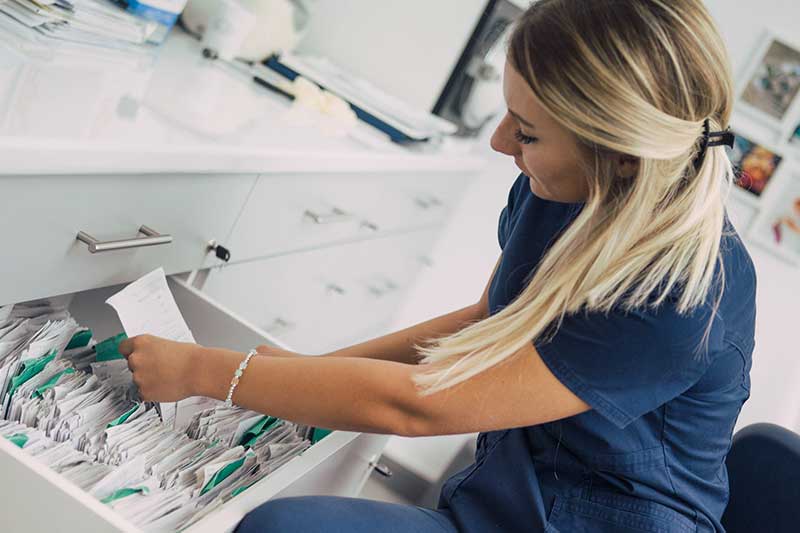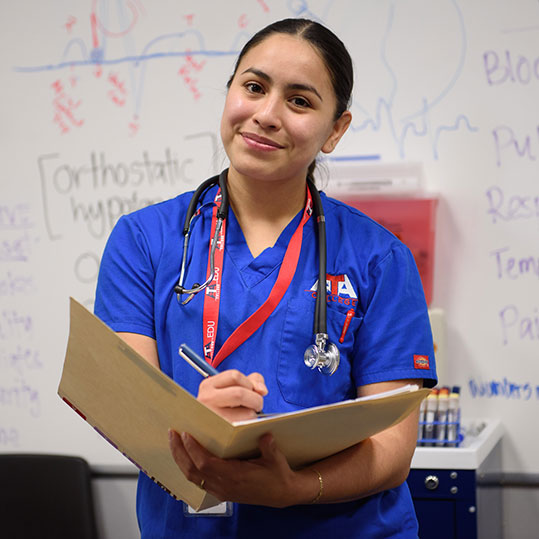Medicine is an exciting field, but a clinical role is not for everyone. The good news is that healthcare is expanding, and there are opportunities for everyone. If you are detail-oriented and have an aptitude for data, why not become a medical records technician? You can satisfy your love of science and medicine while putting your talents to meaningful use in a secure, rewarding career.
What Does a Medical Records Technician Do?
Medical Records Technicians (MRTs) work exclusively with data. Also known as Health Information Technicians, they organize, maintain, and store electronic and paper health records so that they’re easily accessible. Doctors may need them at a moment’s notice. Responsibilities include:
- Reviewing records for completeness and regulatory compliance
- Transcribing medical reports
- Filing documentation
- Scanning paper documents into an electronic chart
- Troubleshooting diagnostic and billing codes
- Managing record security
- Archiving
- Data entry
Medical records require special handling. They follow patients for a lifetime, a single chart could fill a filing cabinet. Today, most documents are kept online, organized in databases by categories from name to diagnosis. Because medical records are used for healthcare as well as billing, medical records technicians need quality training in both health and administrative processes to do their jobs properly.
Do I Need a Diploma to be a Medical Records Technician?
While there’s no education requirement for Medical Records Technicians, most have a diploma or a degree. Healthcare is a complex, highly regulated field and positions carry significant responsibility. Employers prefer trained applicants with proven skills. Having a diploma is the simplest and quickest way to land a good job as a medical records technician.
What Do You Learn During a Medical Records Technician Diploma Program?
Diploma programs are geared for beginners. From start to finish, vocational schools give you the skills you need for success in an entry-level position and beyond. Program topics include:
Keyboarding
Most people today are familiar with keyboarding, but few understand the advanced functions that make keyboards powerful. From improving your typing skills to using specialty keys and the 10-key data entry pad, you’ll learn to make the most of your keyboard as a time-saving tool.
Office Procedures
Medical offices are different than the average business. Functions are similar, but there are special considerations. Courses cover customer care basics plus general office procedures, including filing, data entry, electronic communication, faxing, scanning, and writing correspondence. You’ll be comfortable in your first job, even if you’ve never stepped foot in an office.
Medical Terminology
The medical world has a language of its own, but it’s simple to decipher once you understand how to break terms down into their parts. Instead of memorizing words, you’ll learn what prefixes, suffixes, and roots mean so you can determine what terms mean without reaching for a dictionary.
Consider the term “Benign Positional Vertigo.” “Benign” is derived from the Latin root bene meaning “well.” Positional refers to whether the patient is sitting, standing, or laying down. “Vertigo” comes from the Latin word vertere, meaning to turn or spin. So even if you don’t know what Benign Positional Vertigo means, you can assume it’s a mild condition that causes dizziness with movement.
It’s a must-have skill for medical coding, reading through documents, and understanding where they should be filed.
Anatomy and Physiology
Anatomy is how the body is structured; physiology is how it works. Expanding on medical terminology, the course covers each body system and associated disorders. By the end of the course, you’ll be able to review surgical reports and know which part of the body they pertain to. You’ll use that knowledge not only to organize files but also to put them into categories for billing.
Pharmacology
Pharmacology is the study of therapeutic drugs and how they’re used. Medicines are a large part of healthcare, and the reimbursement structure is complex. This course will help you understand how they’re managed for billing and recordkeeping.
Medical Law and Ethics
The healthcare field is strictly regulated. Working in a medical facility, staff need to be cognizant of the legal and ethical aspects of everything they do. HIPAA, the Health Insurance and Portability Act of 1996, drastically changed how medical records are handled. As a medical records technician, you need to know how to keep sensitive health data secure.
Billing and Coding
Medical codes are alphanumeric sequences used to describe the many diagnoses, conditions, procedures, tests, and equipment used in healthcare. Converting mounds of data into simple codes reduces the sheer volume of information facilities and insurers process. Virtually all medical recordkeeping requires basic coding knowledge.
Electronic Health Records
Electronic Health Records (EHR) are the bread and butter of the recordkeeping industry. Medicine is increasingly reliant on computerized documents, so you’ll need top-notch computer skills and knowledge of healthcare software. This course covers the basics, you’ll learn how data is structured and how to legally add, correct, store and retrieve critical information.
What Are the Benefits of Getting a Diploma?
A college education is never wasted, but what if you don’t have years to dedicate to training? Don’t put your higher education aspirations on the back burner, diploma programs are convenient and affordable with far-reaching benefits, including:
Benefit #1: A Well-Rounded Education
Vocational schools offer the same comprehensive education as colleges but in less time, by focusing on what really matters. As a medical records technician, your employer only cares if you have the right skills, whether you passed an expensive elective pottery course is immaterial.
You will graduate in months, not years with all the knowledge you need to hit the ground running.
Benefit #2: Marketable Skills
Applying for a job as medical records technician without a diploma is likely to take you longer to land. Without one, you’ll constantly be competing with better-qualified candidates. A diploma demonstrates proven skills that make you more valuable as an employee, and you may qualify for better positions.
Benefit #3: Professional Development
No one starts a job at the top of the career ladder; but with a diploma, you have room for professional growth. Employees with formal training are typically among the first to earn promotions. Pursue certification in coding or take additional classes and become a Registered Health Information Technician. From there, you can grow into supervisory or management positions.
Benefit #4: Career Services
Medical records technicians are in demand but graduates still must compete for the best jobs in a crowded field. Finding work is not tough if you are qualified, but landing the right job is a challenge.
Vocational schools work hard to place students, partnering with local businesses to give graduates the first look at the best positions. Career counselors assist students in finding meaningful employment, better schools offer lifetime placement services.
Final Thoughts
The U.S. Bureau of Labor Statistics projects in the health information field to grow 9 percent through 2030, making it a promising time to seek training opportunities. With a longer life expectancy and more seniors getting care, more services will be needed. So, ride the wave of demand in the medical industry and become a medical records technician at ATA College.
Health Information Technician Diploma
After completing the 8-month diploma program at our El Cajon | San Diego Health Information Technician School, you have the option to continue in the Health Information Technician (HIT), Associate of Applied Science program. The associate degree can be completed in an additional 6 months and contains general education courses, along with advanced courses in billing and coding.
Contact us today to learn more about medical records technician career opportunities offered at ATA College.





